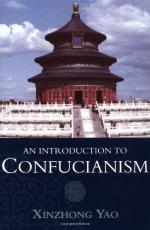|
This section contains 14,761 words (approx. 50 pages at 300 words per page) |

|
Over the two and a half millennia since the death of Kongzi (trad. 551–479 BCE), the figure whose name was latinized into "Confucius" by Jesuit missionaries in the sixteenth century, diverse groups have identified him as the source of their texts and practices. As a result, a wide variety of phenomena are called "Confucianism," many of which appear to have only a distant connection to one another. The term "Confucian" is applied to religious traditions grounded in the transmission and interpretation of sacred texts and practices, as well as to educational, ethical, and social systems. While some have argued that Kongzi's primary message was philosophical and secular, historians are increasingly questioning the justification for considering the ethical dimension of Confucianism as either more original than, or as separate from, its other aspects. Wing-tsit Chan's entries—"Foundation of the Tradition" and "Neo-Confucianism"—in the first edition of the...
|
This section contains 14,761 words (approx. 50 pages at 300 words per page) |

|




